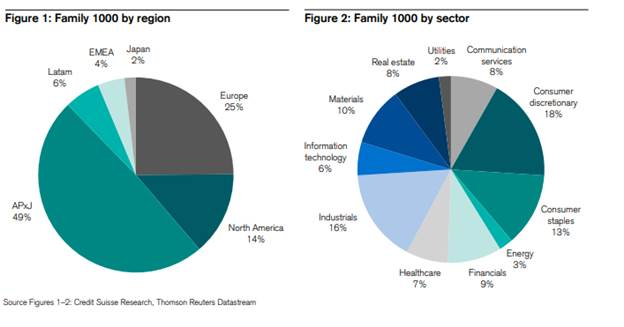Founder-led companies and where to find them
When it comes to founders, it is often the most eccentric that find themselves in the headlines.
By consequence, many of us would be familiar with Elon Musk, Jeff Bezos, Mark Zuckerberg, Jack Ma and the like - some of the largest tech-linked companies in the world.
Given the ease with which these come to mind, one would not be blamed for thinking technology is the sector to look if you want quality founder-led names (Tversky and Kahneman might term this as an instance of the availability heuristic).
In reality, however, the model transcends industries and has evolved over time as businesses become more capital-light and funds easier to access. Accordingly, in the third wire of this collection, I sought to uncover the key sectors where founder-led companies are most prevalent and the drivers of this phenomenon. I reached out to the following fund managers to hear their insights:
- Maroun Younes - Fidelity Global Future Leaders Fund
- Shaun Weick - Wilson Asset Management
- Emma Fisher - Airlie Funds Management
- Andrew McAuley - Credit Suisse
Scaling quickly and scaling effectively
Shaun Weick - Wilson Asset Management
In recent years, successful founder-led companies have tended to be most prevalent in the Technology and Healthcare sectors.
The proliferation of venture capital funds has meant that the barriers to access capital have reduced significantly.
Further, companies can scale quicker than ever in what are increasingly capital-light and global industries, with Software as a Service and eCommerce companies providing strong evidence of this. In addition, the widespread use of the internet allows companies to quickly tap global customers, employees and suppliers, bypassing the traditional expansion from local to national to international.
As a result of this, it is increasingly likely that the founder will still be in charge by the time IPO scale is reached in a business, providing public equity market participants with rising exposure to co-founders.
A recent Bloomberg article reported that 7% of companies with a market capitalisation of more $500m are founder-led globally.
Geographically and sectorally spread
Andrew McAuley - Credit Suisse
We now have 1061 companies globally that meet one or both of our criteria, with almost half of them located in Asia. European family-owned companies make up 24% of the database, while those in the USA represent 14% of the balance. Our database has a small-cap bias given that 49% of our companies have a market capitalization of less than USD 3 billion, while 30% have a market capitalization of USD 7 billion or more.
Our family-owned database has a reasonably good spread across all sectors, with consumer discretionary stocks making up 18%, industrials 16% and consumer staples 13%. The fewest family-owned companies are found in energy (3%) and utilities (2%).
.png)
As far as the duration of our family-owned companies is concerned, we find that the average constituent of our database is now into its third generation, with an average founding year of 1967. If we drill down by Age it shows almost 150 of our roughly 1,000 family-owned companies have been trading for more than 100 years.
Big returns for little capital
Emma Fisher - Airlie Funds Management
Founder-led companies are common in industries with high returns on capital, as an entrepreneurial founder can leverage and execute on an idea with little incremental capital needed. One example where we see a lot of founder-led businesses has traditionally been retail, where a successful concept can be rolled out across many stores for little capital e.g. businesses like Harvey Norman, Nick Scali, and Premier Investments. Similarly, the tech sector is littered with founder-led companies, as these are typically businesses that require little start-up capital but need a great idea and a visionary founder to execute.
That said, our owner-managed index is surprisingly diversified in its constituents, with businesses spanning mining (e.g. FMG, MIN), media (e.g. NWS), retail, industrials (e.g. REH, SVW), healthcare (e.g. SHL, RMD) and REITs (e.g. GMG).
Consumer businesses are built by real people
Maroun Younes - Fidelity Global Future Leaders Fund
There is actually a reasonably good spread of founder-led companies across most sectors, with perhaps the exception of utilities and energy, which tend to be very capital-intensive and also usually have heavy regulatory and geopolitical elements to them.
One area that does stand out amongst others however is consumer (discretionary and staples). Over 30% of the 1000 founder and family-led businesses that are compiled by Credit Suisse come from the broader consumer segment.
Why are founder-led businesses more prevalent in the consumer space? Well, the ingredients to success in the consumer space lend themselves quite well to the advantages that founder-led businesses inherently possess.
Firstly, consumer businesses are often built over the long term. A lot of investment needs to go into building a brand, and this investment finds its way primarily into sales & marketing. However, it is not the sales & marketing spend that is aimed at quickly closing sales in the short term, such as heavy discounting, promotions and commission. Think of Nike, or Louis Vuitton - both have spent a lot of money curating their brand and invoking a particular type of emotional response with their customers.
In addition to brands, consumer businesses need to stay close to the customer. They need to be innovative and agile in order to anticipate and respond to any changes in consumer preferences. Founder-led businesses are usually more attuned to their front line. They also tend to be less bureaucratic, allowing more rapid communication and iteration between the customer-facing staff and management.
Conclusion
We can see that founder-led business can be identified across industries and countries - you just have to look hard enough. The increasing accessibility of finance and reducing need for extensive CAPEX outlays has made it much easier for founders to scale businesses from day 1 through to IPO without relinquishing control.
Join me and our guests in this collection, where we will explore the purpose of founder-led companies and potential risks investors should be aware of, before discussing their tips for the next founder-led behemoths.
I will also be launching a Fund Manager Q&A with Lawrence Lam from Lumenary Investment Management, whose investment strategy revolves around the idea of finding companies that are founder-led.
Stay up to date with this series
Make sure you "FOLLOW" my profile to be notified of the upcoming entries in this series.
If you enjoyed this wire, please click like and comment below what sectors you find the most interesting founders in.
5 topics
11 stocks mentioned
7 contributors mentioned

